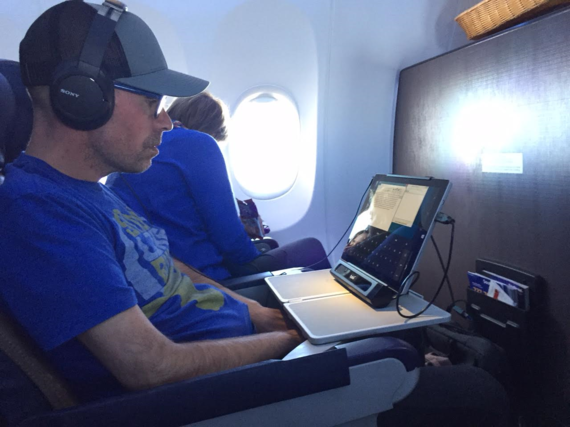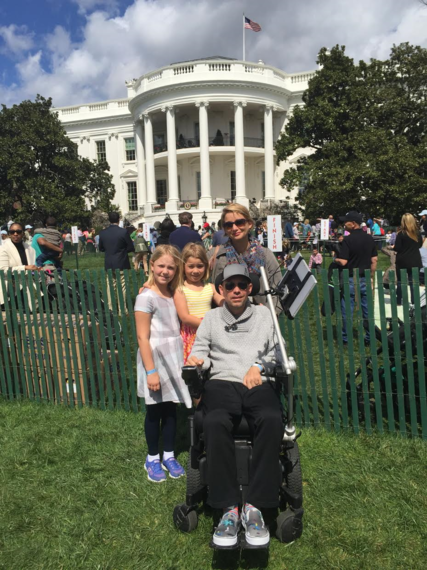One of the most common questions I get from my readers is about travel. How do I do it with ALS? How do I travel if I can't walk, eat, or talk? First, I should say I love traveling and everything that goes along with it - from the feeling I get in my gut during takeoff to the tiny shampoo bottles that inevitably end up in my luggage. I feel most alive when I'm on the move. My kids are six and eight and have been on airplanes since they were just a few months old. My traveling adventures have taken me all over the world and while my disease has slowed me down, it has not stopped me from sipping ginger ale through tiny straws at 30,000 feet.
Traveling with a paralyzing, terminal illness is not for the faint of heart. Here are 10 things you should know if you want to defy (or just completely ignore) the limitations of your disability.
1. Don't be afraid. If you think you can't do it, have someone take your non-working arm and slap you in the face. I wrote this entire piece on a flight from DC to Austin in mild turbulence using only my eyes. If you set your mind to it, anything is possible...well anything besides more leg room.
2. Have a rock star companion. I can't stress this enough. I'm not talking about someone who is willing to get drunk with you on mini-bottles of wine in row 12, I'm talking about someone who can make you laugh while wiping your ass in the middle of the night. My wife is that rock star. Not only does she take care of all my needs, she makes it all look so easy and never complains (at least not to me). As I write this she is adjusting my headphones for the 5th time and we're not even through the first beverage service.
3. Flying with a wheelchair is not your problem. Airlines are required to accommodate you and your wheelchair, no matter the size. I have the Hummer of wheelchairs, a 450 lb. Quantum Edge that does everything but make coffee. Just let the airline know you have a wheelchair and they will take care of the rest. If you're worried about damage don't be - anything that breaks on their watch is covered. Just be sure you check for damage and report it before leaving the airport.
4. Don't worry about getting to your seat. You will have to leave your wheelchair on the jet bridge. And then you can look forward a couple of sweaty dudes, with the fragrance of BO and exotic food truck cuisine, strapping you into an aisle chair and whisking you into whatever seat you want. You'll be the first one on and the last one off but you won't be stuck sitting in between the lady who thinks it's okay to eat a rack of homemade ribs and the guy who is pretending to sleep but really farts the whole flight. Trust me, I've been that guy before, something about air travel brings out the gas in me.
5. The TSA is suddenly your friend. Maybe it's pity or fear of a lawsuit, but the agents who make Paul Bart look like the Secret Service go out of their way to accommodate you. Don't worry about your liquid feeding tube formula, bag limits, or taking your shoes off, you'll be treated to a private "massage" ( as my eight year old calls them) in the comfort of your own chair. And if you're in a rush, nothing will get you through faster than a full catheter bag and a puddle of drool on your shirt.
6. Piss in your pants. Sorry ladies, this one is for the guys only. A condom catheter will let you pee comfortably over the Grand Canyon, which if you look now is just over the left side of the plane.
7. Make a city your destination. The most challenging part of traveling disabled is getting a wheelchair accessible van once you get to your destination. Most major cities will have wheelchair cabs. You should call ahead to reserve and check availability. You may have to wait, and sometimes for hours, but you should be able to get where you need to go. Make sure to tip your driver generously to help create a direct line to the driver for the remainder of your stay.
8. Pick someplace new. Older cities can be hard to navigate. Cities like Boston and DC were fully built out before ADA regulations. Newer cities like Denver and Orlando are easier to get around. I even found a whole list of accessible hiking trails in Denver last fall.
9. Stay at nicer hotels. All hotels are required to have accessible rooms but aren't required to hold them, even if you have a reservation. I found this out the hard way. Last year we reserved a room at the Comfort Inn near Red Rocks in Colorado only to find out upon arrival they gave our room away to a non-disabled guest. Even if you call ahead you can't be sure. Skip the crappy continental breakfast and stay in a hotel that will save your room.
10. Fly direct. Before ALS I was a budget traveler. I would drive hours out of my way for a deal and endure grueling layovers to save a buck. Now I can't afford to lose my medical devices or risk my wheelchair not making the connection. Don't be tempted by cheap fares. Make sure you stick to direct flights, preferably on Southwest. They are by far the most handicap-friendly airline. Or is it disabled? I can never get that right.
And, finally, be patient and flexible. From weather conditions to backed-up toilets, you can't plan for everything. Remember, you're traveling in a seat going 500 miles per hour for a few hundred bucks - that fact alone should amaze you. If you're gate isn't ready when you arrive, don't be the guy that moans and groans about it. Instead be thankful to be alive and enjoy the adventure of life.

